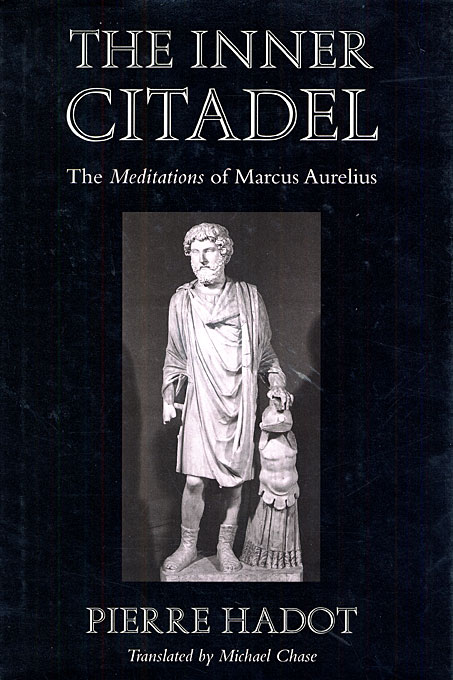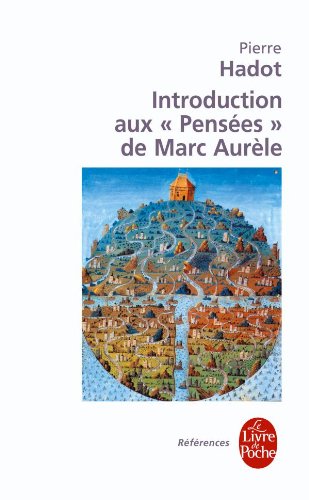Pierre Hadot - The Inner Citadel
Background
If there is someone who deeply influenced me in the last 6 months, it’s Ryan Holiday. Last summer, I stumbled on his monthly reading newsletter (you should subscribe here, it’s well worth it), and I found some great books to read. But if you have to start somewhere, go to his Reading List, and you will find some jewels.
The first book from his list is Marcus Aurelius “Meditations”, who he describes as :
To me, this is not only one of greatest books ever written but perhaps the only book of its kind. Just imagine: the private thoughts of the most powerful man in the world, admonishing himself on how to be better, more just, more immune to temptation, wiser. It is the definitive text on self-discipline, personal ethics, humility, self-actualization, and strength.
After this presentation, the only reasonable thing to do was to read it.
So I bought an abridged version of it in French last summer1. I quite liked it, but I didn’t fully understand what Marcus Aurelius meant in some paragraphs, so this wasn’t the earth-shattering book that I was promised.
Still intrigued by it, I decided in March to get a copy of the next book on the subject, who purposely could explain to me what Marcus Aurelius really thought when he wrote it, why he uses this style of writing, and, by extent, what really is stoicism.
This book was Pierre Hadot’s The Inner Citadel2, and I really recommend it to you if you’re remotely interested in stoicism3.
The book
If you first open Meditations, you will probably find yourself a bit lost. Why does the author write like this? What does he truly means when he says those things?
This is because this book wasn’t meant to be read by other people that the author himself. What you will read are excerpts from his personal journal that have been saved from oblivion. That’s why you will find him repeating the same things over and over in the book: he uses it as a way for himself to remember those principles and to apply them every day.
So, for a stranger, this could be a bit confusing, more so if you consider that the book was written almost 2000 years ago, and there are still parts that are forever lost. Take for example this excerpt:
“Discard your thirst for books, so that you won’t die in bitterness, but in cheerfulness and truth, grateful to the gods from the bottom of your heart.” (Meditations, Book 2, III)
What does he mean? Why on earth someone like Ryan Holiday, who read an unfathomable amount of books every month, would abide by this author and stoicism? This doesn’t make sense!
This is because Marcus Aurelius doesn’t write this for you, he writes it for himself. When he wrote this sentence, he was reaching the end of his life. So, he wanted to use his time left to act. Now, the sentence doesn’t mean the same thing anymore and doesn’t conflict with the book thirst that you should have in the early days of your life (who should extend in its entirety).
This is one of the insights that will give you Pierre Hadot’s book. It does a great job at explaining every difficulty that you could stumble on when reading it.
He goes to great lengths to describe difficult concepts and making them accessible. He also compares Marcus Aurelius writing to Epictetus’, from which he deeply inspired himself from, and use it to give a very thorough account of the stoic philosophy.
This is why if you’re interested in Marcus Aurelius book, you should read this one first. It removes the possibility of a misunderstanding, and give some rich background to the whole piece.
 |
 |
|---|---|
| Buy it on Amazon | Buy the French version |
This article is part of a series called The Book Corner, where I post short reviews of books that I found on the internet and thought they were worth sharing. If you’re interested, you can find more on this page.
As a young foreign student, I’m looking to perfect my writing. If you have some time to give me feedback about this article or anything else, please reach out on Twitter or via email. This is greatly appreciated. Thanks!
-
It was an e-book, so I wasn’t really aware at the time that it was the abridged version. Shame on me. ↩︎
-
This book has two titles in the french version. The first one vas La citadelle intérieure, used for the english translation; and the second one, used for the re-edition, was Introduction aux Pensées de Marc Aurèle, who carries way better the true purpose of this book. ↩︎
-
As a disclaimer : I only read the original version in French, so I can’t vouch on the quality of the translation. If you are a francophone, you can find this version here. ↩︎